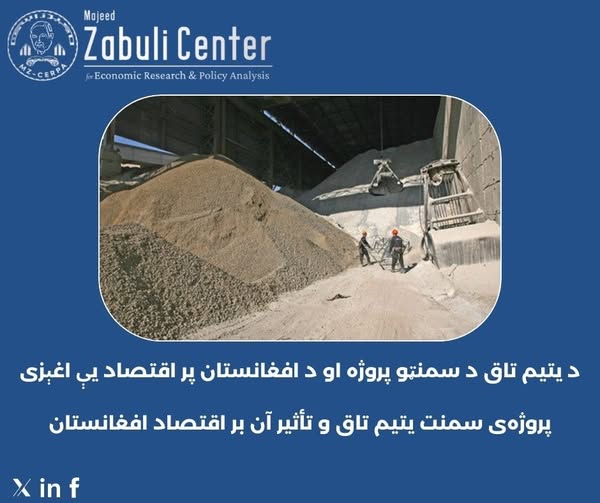19 Jan,26
Most Searched Keywords
05 Aug
The Yateem Taq Cement Project and Its Impact on Afghanistan’s Economy

The signing of a $163 million agreement with the Turkish company 77 for the establishment of a cement production facility in the Yateem Taq area of Jawzjan province marks a significant step toward Afghanistan’s economic development. This investment is seen as a positive move toward the country’s goal of economic self-sufficiency, aiming to reduce reliance on imports and strengthen domestic production. The following outlines the key economic impacts and objectives of this major project.
The cement plant is expected to have a production capacity of 3,000 tons per day and will create approximately 1,200 direct jobs, providing a strong economic foundation for local families and contributing to regional stability. Additionally, the project will generate demand for supporting services such as transport, equipment maintenance, and raw material supply, leading to secondary employment opportunities and boosting the local economy.
One of the most significant outcomes of this project is its potential to reduce Afghanistan’s trade deficit. Historically dependent on cement imports, Afghanistan has faced a growing trade imbalance. Producing 1.5 million tons of cement annually in Yateem Taq will significantly cut the need for imports, improve the trade balance, and elevate domestic production. This in turn is expected to lower construction material costs, stimulate investment in infrastructure and housing, and pave the way for sustainable economic growth.
The agreement with Turkey’s 77 Construction Company also serves to attract further international investment. It sets a precedent for other global companies to consider Afghanistan as a viable investment destination. This type of foreign investment not only diversifies Afghanistan’s economy but also positions Turkey as a key economic partner. The project demonstrates risk-managed investment, encouraging other firms to explore opportunities in the country.
The 30-year agreement offers long-term economic benefits. Over this period, Afghanistan’s workforce will gain valuable skills in industrial production and management, enabling future independent project development. The plant will contribute to the country’s industrial foundation and strengthen the national economy over time.
Regionally, the Yateem Taq project plays a critical role in expanding industrial development across Afghanistan. It sets the stage for similar cement production initiatives in Jabal al-Saraj, Kandahar, and Herat, building an extensive industrial network. Establishing production centers throughout the country will reduce transportation costs and enhance local markets, leading to a more balanced economic structure where all regions benefit from growth.
The Yateem Taq cement project is not merely an infrastructure development; it is a strategic effort toward Afghanistan’s economic self-reliance. By reducing import dependency, creating employment, attracting international investment, and strengthening local industries, this project lays the foundation for long-term, sustainable economic growth and plays a transformative role in Afghanistan’s path toward prosperity.
